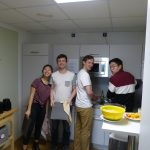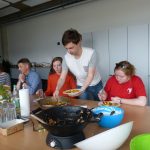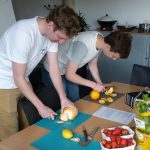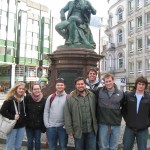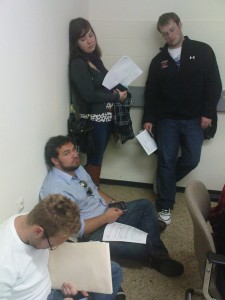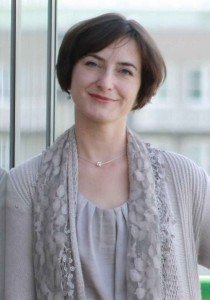
Dr. Janine Ludwig
“Change” is possibly the best word to describe our last year here in Bremen, and so much has happened that we are unable to put it into one paragraph. First, Dr. Janine Ludwig took over as as new Academic Director of the program; the former director for one year, Carl Wege, took the chance to lead a research project in Bielefeld. After Dr. Ludwig, accompanied and assisted by Jens Schröder, a Bremen student and Program Coordinator since 2008, made an introductory visit to Dickinson at the end of September, during which we had many meetings and talks with different departments and people, we came back with a basket full of contacts, plans, ideas, requests and wishes. So we slowly started to restructure the program in order to meet these new challenges, to establish closer ties with the University of Bremen, and to improve the overall quality of our students’ stays.
We started small by first improving the Dickinson Room, which acts as our office and is also the place where our students can work and spend time between classes. We are now able to show movies, to invite people or parents over, and to hold video conferences and meetings there. Additionally, we created a media presence around our program, most visibly through our collective blog, where students also have the chance to upload pictures and videos. Of course, we are on Facebook as well ;-).
Dr. Ludwig designed an immensely rich and deep course for our Dickinson and Uni Bremen students that spans 300 years of transatlantic history: “Comparative Cultures – USA/Germany” that is part of the German major and listed as German 340 (please see: http://blogs.dickinson.edu/bremen/2018/01/20/german-340-comparative-cultures-usa-germany/).
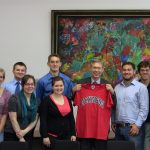
Students with Dr. Carsten Sieling
Furthermore, Dr. Ludwig enhanced and enriched our excursions with stronger academic and historical content, matching students’ general academic interests. Whereas our first excursion to Vienna more generally presented the history of Germany, Austria and Europe, the next field trips where specifically designed according to student interests and majors: in Berlin, for example, we met with the German parliament representative from Bremen, Dr. Carsten Sieling, for a talk about the financial situation in Bremen and the economic crisis.
We also met with Hans-Ulrich Klose, a high-ranking politician and former major of Hamburg, who now serves as the federally appointed Transatlantic Coordinator for German-American partnership. Both visits gave the students unique insight into German politics. On our last excursion, to Brussels, we met with Dr. Helga Trüpel, a Member of the European Parliament who talked about Bremen’s relation to and role within the EU parliament. We visited the EU parliament, the embassy of Bremen and – of course – the Atomium. In each city we also tried to create a balanced program for the students, including time to pursue their own interests and to get to know life in the city itself.
At home, we intensified our ties with the University of Bremen. Very helpful in this process is the new head of the International Office here at the University, Dr. Annette Lang. Our closer cooperation led for example to an invitation for our Dickinson students to attend a private discussion with Auma Obama, half-sister of President Barack Obama. Dr. Ludwig contacted and continues to meet with many people at Uni Bremen, making our program – which formerly had been best known to students from Cultural Studies – more widely known and present on campus and in various departments. Last but not least: Our own cooperation agreement was also renewed this July. President Bill Durden and Rector Wilfired Müller signed the improved agreement which also served as a “birthday” present for our program – this year we celebrate the 25th anniversary of our partnership.

From left to right: Elke Durden, Sarah McGaughey, Janine Ludwig, Bill Durden
A telling sign of the strong relationship between Bremen and Dickinson followed in early July: the first presentation of an honorary degree in Dickinson’s history outside the United States! German writer and poet Günter Kunert was

Poet Günter Kunert (right)
conferred with the honorary degree of Doctor of Letters here at the University, led by President Durden and attended by Rector Müller, Professor McGaughey (of the Dickinson German Department), students, friends of Dickinson College and members of the university.
But we cannot forget our core responsibility of the program – our students. Among other things, Dr. Ludwig helped our student Kelsey Power to secure an internship at the Psychology Department here in Bremen. For a semester she was involved with the daily routine of the clinic and part of a team that performed diagnostic and therapy sessions as well as statistical tests to generate IQ scores. A valuable insight for a psychology major! (http://blogs.dickinson.edu/bremen/2010/04/26/internship/)
Besides their studies, the students followed their different interests. Andrew Shuman joined a local soccer club where he could continue practicing, as did Braeden Eastman and Thomas Vari with ultimate frisbee; other students went to festivals and travelled across Europe. Brent Te Velde, a program student from Trinity University, was able to enter the music conservatory here in Bremen and continued playing the organ in several nearby churches. And, of course, all students became huge fans of Werder Bremen, the professional local soccer club. They went to matches and training, bought jerseys, and collected autographs. This experience was only topped by the World Cup, where they celebrated every victory Paul the Octopus predicted in the streets with thousands of other Germans, doing so – most importantly – in German and with the German friends they made!






